Yama BarizBBC Afghan Service, Kunar and
Emily AtkinsonBBC News
A fresh magnitude-5.2 aftershock has struck eastern Afghanistan – two days after a powerful quake in the same region killed more than 1,400 people and injured 3,000 others, according to the Taliban government.
Rescue efforts following Sunday’s magnitude-six quake have been complicated by landslides that have blocked roads, making land travel difficult.
Helicopters have been deployed to aid the search for survivors in the ruins of remote villages, where many are feared trapped under the rubble.
The Taliban government – which is only recognised by Russia – has appealed for international help. The UN has released emergency funds, while the UK has pledged £1m ($1.3m) in aid.
Afghanistan is prone to earthquakes, but Sunday’s tremor was one of the strongest to hit in recent years.
The aftershock on Tuesday came at 12:29 (07:59 GMT) with its epicentre 34km (21 miles) away from Jalalabad, the country’s fifth-largest city, according to the US Geological Survey (USGS). It was shallow, at only 10km deep.
A BBC reporter in the Sawkai district – one of the worst affected areas in the north-eastern Kunar province – said they felt a strong jolt.
There are no reports of damage or new casualties.
Helicopters are being used to airlift survivors out of remote villages in Kunar province – where most of the deaths and injuries occurred.
The terrain was so rough in one part of the Mazar valley that one helicopter failed to land after three attempts, one Taliban source said.
Survivor Bas Marjana, a resident there, told the BBC: “We were all in deep, peaceful sleep when… a sudden tremor struck, and the world turned upside down.”
She said she was rescued from underneath the rubble of her home, but several other family members were buried. She said eight of her grandchildren and her daughter-in-law were killed.
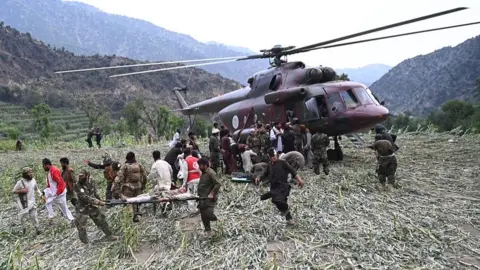 Getty Images
Getty ImagesAid agency Save the Children has sent medical teams to the Kunar province to treat and rescue people in remote areas, where it said thousands were in urgent need of food, water and shelter.
One volunteer, identified only as Dr Shaheer, said some people has resorted to drinking river water.
“The situation of children is severe. If they do not receive support, children in the earthquake-affected areas will face nutrition, health, and other challenges,” he added.
Médecins Sans Frontières (MSF) said its teams had reached two hospitals, one in the Nangarhar province and the other in the Laghman province.
Fazal Hadi, MSF deputy medical coordinator, said the humanitarian response needed to “scale up urgently”.
“The two hospitals were already working at full capacity before the earthquake. We saw many patients treated in the corridors and health workers in need of supplies,” he added.
At Jalalabad’s Nangrahar Regional Hospital, earthquake survivor Nader Khan broke down as he recalled how he lost two sons and two daughters-in-law to the earthquake.
Khan, who is in his 60s, said he was able to save to grandchildren but now he does not know where they are.
“I injured my head and spine, so I couldn’t move to save them… I don’t know what has happened to the bodies of my sons,” he told the BBC.
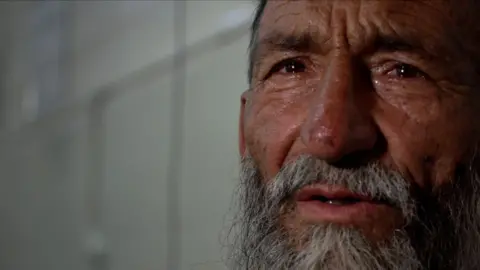 BBC Afghan Service/Abbas Farzami
BBC Afghan Service/Abbas FarzamiMir Zaman told the BBC that he pulled his dead children out of the rubble by himself.
“It was dark. There was no light. Someone lent me a lamp, and then I used a shovel and pickaxe to dig them out. There was no-one to help because everyone was affected. So many people died in my village. Some are still buried. Whole families have died,” he said.
Two-and-a-half-year-old Maiwand suffered head injuries and blood loss.
“You can see his situation. It’s so tragic. The earthquake was deadly. I want the doctors to treat him, to cure him,” said the child’s uncle, Khawat Gul.
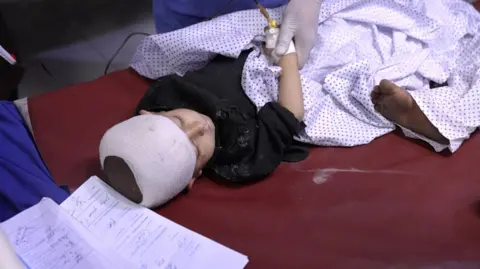
A doctor at Spinghar Medical in Jalalabad told the BBC that around around half of the 100 patients who had been admitted since Sunday were women.
Dr Noor Saba said a further 15 patients were brought in on Tuesday, many of whom had serious injuries.
“Some had head injuries, others had spinal or other body parts injured. Seven or eight underwent surgery. One had a fractured leg, another had a broken back,” she added.
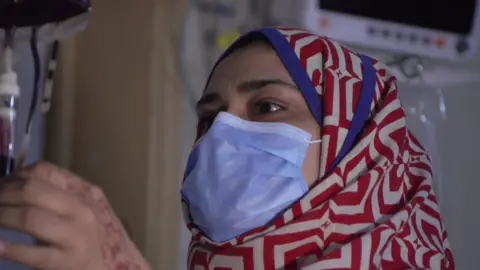
The most recent earthquake hit Afghanistan when it is reeling under severe drought and what the UN calls an unprecedented crisis of hunger.
The country has also experienced massive aid cuts especially from the US this year which is further reducing the aid that many of these people could have got. This disaster couldn’t have come at a worse time.
Britain’s Foreign Secretary David Lammy said aid from the UK will be “channelled through experienced partners”, the UN Population Fund (UNFPA) and the International Red Cross.
India has delivered 1,000 tents to Kabul – and is also helping to move 15 tonnes of food from Kabul to Kunar province, Delhi foreign minister said.
China and Switzerland have also pledged support.
Additional reporting by Hafizullah Maroof, Stuart Lau and Ewe Koh.

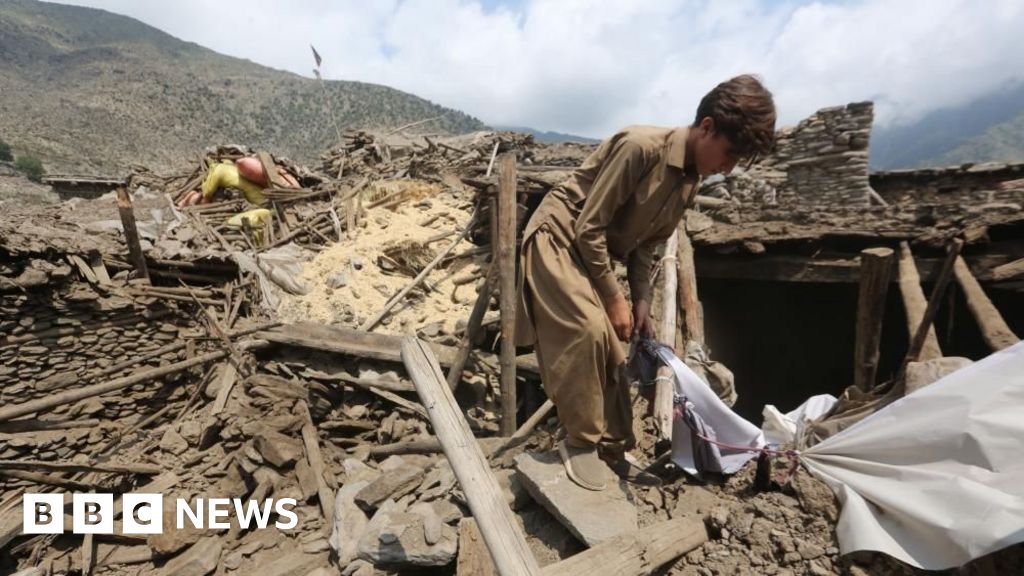

)
